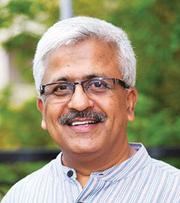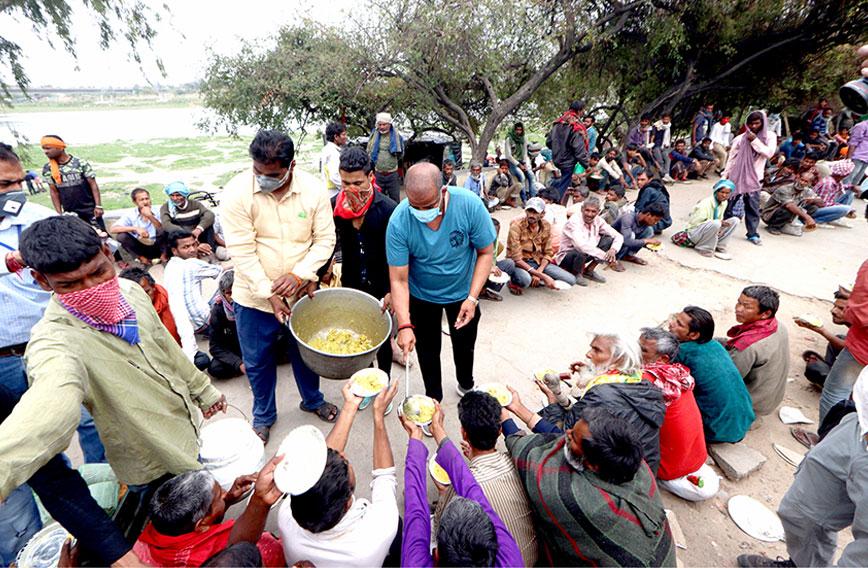
R BALASUBRAMANIAM
A lot has changed in the past month. The COVID-19 crisis has thrown up challenges on the public health front and on the personal front for each one of us. We are not only doing our bit in handling this problem but we are also coping with the disarray in our lives.
Little more than a month ago I had the opportunity to visit a small two-acre plot cultivated by Bommi, an indigenous Kadukuruba tribal woman, in a remote part of Mysuru district. She proudly showed me the high-yielding ragi (millet) that she had cultivated this year. This was the first time that anybody in her area had grown this variety. She explained to me that the harvest expected in the coming month would be three times what she used to get from the traditional ragishe cultivated earlier. She excitedly told me that she would share the seeds from her crop with her neighbours and make sure that they also benefited from her experiment. Bommi was looking forward to all her friends and relatives helping her with harvesting and threshing the crop.
Neither Bommi nor I nor anybody else could have imagined that a month can be a long time in our lives. Today, she is finding it difficult to mobilize her community to help her save her crop. The crisis has thrown life out of gear not just for her but for millions of people around the world. Not only does Bommi have to worry about the virus and finding soap and fetching water to keep washing her hands, social distancing has meant having no one to help her harvest her crop.
While the crisis has exposed the vulnerability of governments, of health systems, global bodies and of each one of us, it has also brought out the indomitable spirit of humans, the leadership of the heads of some nations, the collective resolve of the scientific community, the softer side of the business world and the goodness in each of our hearts. Though our health systems have not been prepared for such a pandemic, the courage and spirit of our frontline health workers, security agencies and volunteers are exemplary.
From social distancing to changing the way we greet each other, to altering personal habits and behaviour, to recognizing the importance of professions that we took for granted, things are not the same anymore. This crisis has defined a new normal for all of us. And it is impressive to see how each one of us is adapting and coping with the manifold demands imposed on us.
For the privileged few, this may be the time to catch up on one’s reading, try new online courses or just spend quality time with the family. For the young, it may be the time to discover new online games and catch up with their favourite shows on Netflix or Amazon. For a few others, boredom and isolation can tax their mental health. For several IT employees, it may mean the invasion of their offices into their homes. Whether we call it work from home or working at home, things are no longer the same anymore.
But for people like Bommi, this new normal is making demands that few of us can relate to or comprehend. The only petty shop that was close to her home has now run out of stock as the local grocer is no longer able to travel to Mysuru city to get fresh stocks. While nature has been kind and Bommi is able to pick several ‘greens’ in the fields around, she worries about how she will feed her family this coming year with harvesting not likely to happen on time. Direct bank transfers are a godsend but then people like her are worried as the bank is not open for her to withdraw cash. The manager and the clerk used to travel each day from the nearest town but are not able to do so now.
While digital transactions and online purchases have become a way of life for urbanites, people like Bommi operate in a world where physical proximity is the norm for both social and economic sustenance. She prays that none of her family members falls sick as there is no way of reaching the hospital 20 km away. Lack of public transport has exposed how vulnerable our poor, with no private means of transportation, are.
While the country’s economy and the plight of migrant workers are being debated on television, what is not spoken about is how important the little money that these workers send back to their families in the villages is. People like Bommi can today talk of agriculture only because of the money that their children send back from distant cities. While our public agencies are responding to the crisis, we need to ensure that the needs of both our urban and rural areas are addressed. Geographic disadvantages will now be more visible as India learns to manage the public health challenge of her rural hinterland. We also need to keep in mind that only when our farmers continue to do what they have been doing will the rest of India have food to eat.
This is also the time for us to understand how deeply intertwined and interdependent our lives have become. The more we practise social isolation, the more we recognize the need and importance of several people who have quietly kept society moving forward — whether it is our daily newspaper boy, or the milkman, or the domestic help, the barber down the street or the security personnel outside our apartments, or the farmers toiling in the sun every day — each one is critical and we now need to ensure that we show our togetherness with them all.
The coronavirus does not differentiate between rich and poor, the urbanite or the rural dweller, the doctor or patient, the merchant and the working class, the employer and employee, the several castes that India has, or the public sector and the private sector…then why should we human beings do so? Let us resolve to use this opportunity to dissolve all barriers of separation and unite – not just to fight the virus but all the other inequities that we have created for ourselves.
Dr R. Balasubramaniam, founder of the Swami Vivekananda Youth Movement, Mysuru, is a development activist and author. www.drrbalu.com
Comments
Currently there are no Comments. Be first to write a comment!




